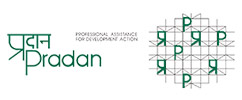

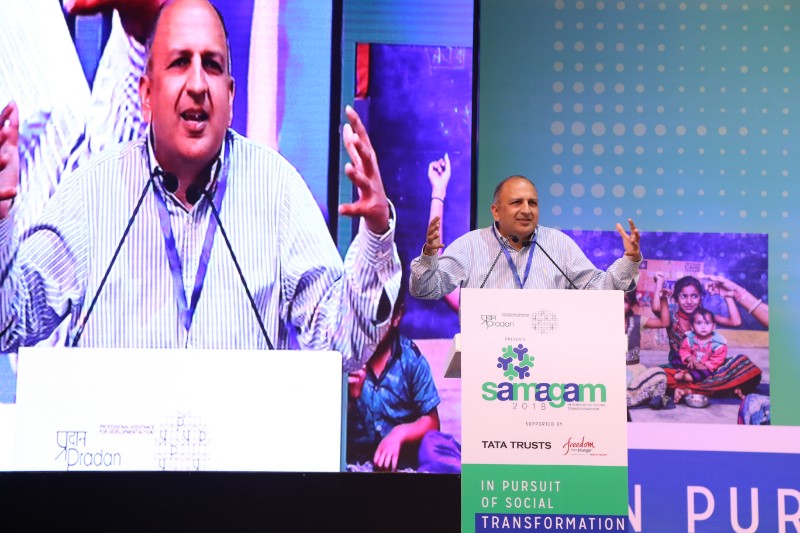 In his speech, Dr. Mehta expressed his joy at being the key note speaker on the occasion of the 35th Foundation Day of PRADAN. Congratulating PRADAN on this achievement he articulated that PRADAN is not just an organisation but an idea which exceeds itself. How would India’s developmental trajectory look like if the ideas PRADAN stood for and implemented were to become central to the developmental imagination at the level of the State and the society in general. While there have been appreciation of PRADAN’s work on the ground, there has seldom been any effort to take it to heart. PRADAN was a revolutionary force in thinking of the role of gender to development. Contextualising the role that gender based gaps have played in deterring India’s growth, he referred to the comparison with China. The very fact that the participation of women in the workforce in China outnumbers India by miles and women’s sense of agency has been the driver of growth is the fundamental difference in the two countries is never pointed out by analysts. “Despite organisations like PRADAN, SEWA and many more that understood importance of gender equality and worked around it since inception, in the mainstream it is still treated as a sectarian fact – gender is another social sector thing we will get to. If India had mainstreamed what PRADAN had thought of 25-30 years ago, our priorities would have been different and we probably would have had much more success in achieving what we are trying to achieve as a nation” mentioned Dr. Mehta. He pointed out that the importance of human capability in making a state successful or the markets successful completely escapes the Indian intelligentsia. There has been too much focus on the list of deliverable services as key to bring in change. Instead if the nation had asked what would be the human prerequisites on the ground to drive the change, the outputs today would have been very different.
In his speech, Dr. Mehta expressed his joy at being the key note speaker on the occasion of the 35th Foundation Day of PRADAN. Congratulating PRADAN on this achievement he articulated that PRADAN is not just an organisation but an idea which exceeds itself. How would India’s developmental trajectory look like if the ideas PRADAN stood for and implemented were to become central to the developmental imagination at the level of the State and the society in general. While there have been appreciation of PRADAN’s work on the ground, there has seldom been any effort to take it to heart. PRADAN was a revolutionary force in thinking of the role of gender to development. Contextualising the role that gender based gaps have played in deterring India’s growth, he referred to the comparison with China. The very fact that the participation of women in the workforce in China outnumbers India by miles and women’s sense of agency has been the driver of growth is the fundamental difference in the two countries is never pointed out by analysts. “Despite organisations like PRADAN, SEWA and many more that understood importance of gender equality and worked around it since inception, in the mainstream it is still treated as a sectarian fact – gender is another social sector thing we will get to. If India had mainstreamed what PRADAN had thought of 25-30 years ago, our priorities would have been different and we probably would have had much more success in achieving what we are trying to achieve as a nation” mentioned Dr. Mehta. He pointed out that the importance of human capability in making a state successful or the markets successful completely escapes the Indian intelligentsia. There has been too much focus on the list of deliverable services as key to bring in change. Instead if the nation had asked what would be the human prerequisites on the ground to drive the change, the outputs today would have been very different.
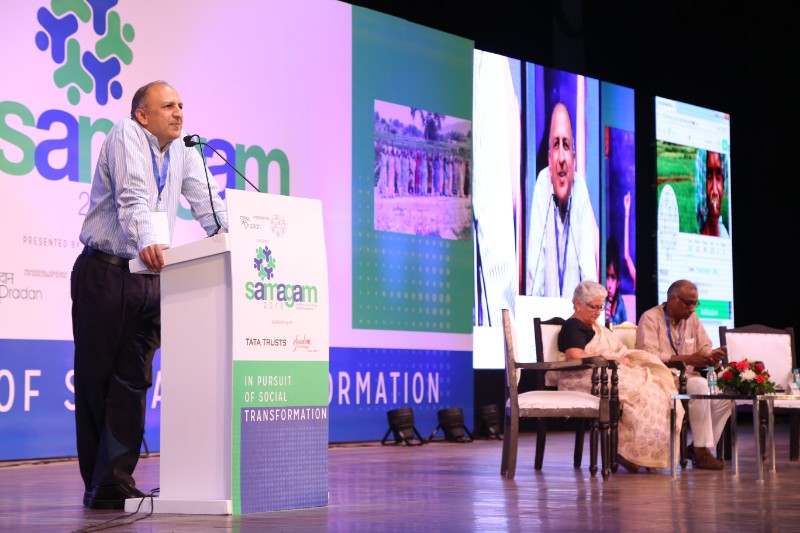 There has been extraordinary growth in the civil society in the last two decades, but still the CSOs are always under the scanner and fingers are pointed at them. A sneering view reigns – do we at all need so many NGOs? Albeit the fact that today the CSOs are doing extraordinary work in their own sphere and making a difference to the lives of many but in a way relatively the paradigm of development remains unchanged. The civil society is precarious because of regulation, the democratic clamour for accountability or FCRA rules and the public think that the civil society is even more untrustworthy than the political parties or corporations. It will not be wrong to assume that this clamour for accountability will grow independent of government and the presumption that civil society is suspicious rather than innocent will persist. The CSOs will have to be resilient and continue to be imaginatively working on the premise to prove that there are diverse forms of accountability and that the democratic system already exists in place. SEWA and PRADAN are good examples. However, the State comes with a dual conceit: the conceit that it can formalize everything and on the other hand not even being aware about its actual capacity to do so. This project of formalization for civil society will be challenging in terms of easier participation in the sector. One advantage of informality is that there were low entry barriers; anyone could enter the market.
There has been extraordinary growth in the civil society in the last two decades, but still the CSOs are always under the scanner and fingers are pointed at them. A sneering view reigns – do we at all need so many NGOs? Albeit the fact that today the CSOs are doing extraordinary work in their own sphere and making a difference to the lives of many but in a way relatively the paradigm of development remains unchanged. The civil society is precarious because of regulation, the democratic clamour for accountability or FCRA rules and the public think that the civil society is even more untrustworthy than the political parties or corporations. It will not be wrong to assume that this clamour for accountability will grow independent of government and the presumption that civil society is suspicious rather than innocent will persist. The CSOs will have to be resilient and continue to be imaginatively working on the premise to prove that there are diverse forms of accountability and that the democratic system already exists in place. SEWA and PRADAN are good examples. However, the State comes with a dual conceit: the conceit that it can formalize everything and on the other hand not even being aware about its actual capacity to do so. This project of formalization for civil society will be challenging in terms of easier participation in the sector. One advantage of informality is that there were low entry barriers; anyone could enter the market.
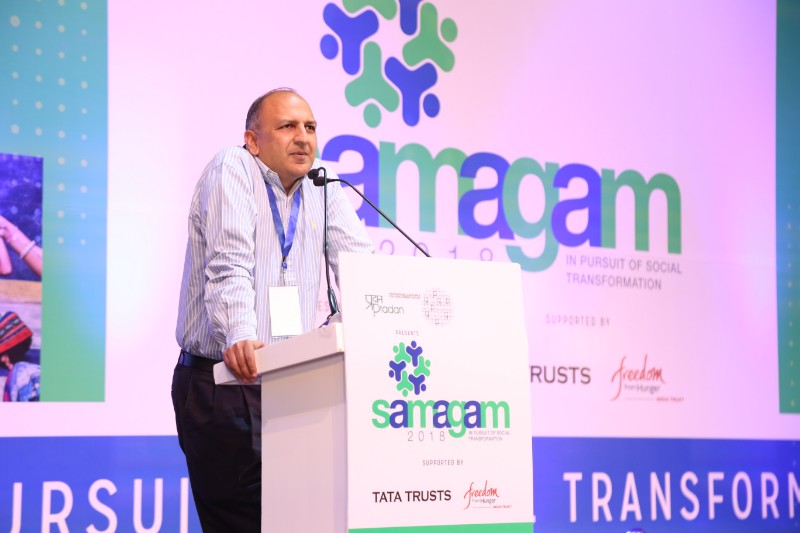 While speaking about the spectre of social failures in India he attributed them to be the most profound failures. He pointed out what does it mean to interact with a citizen on some minimal basis of reciprocity, what does it mean to overcome a society which has the vilest form of discrimination any human society has invented? Almost all the weaknesses and pathologies of the nation are deeply rooted to social failures which obviously cannot be cured by laws or administration. It requires a deep transformation about our sense of self and its relationship with others.
While speaking about the spectre of social failures in India he attributed them to be the most profound failures. He pointed out what does it mean to interact with a citizen on some minimal basis of reciprocity, what does it mean to overcome a society which has the vilest form of discrimination any human society has invented? Almost all the weaknesses and pathologies of the nation are deeply rooted to social failures which obviously cannot be cured by laws or administration. It requires a deep transformation about our sense of self and its relationship with others.
He ended the keynote address with some prognostication which again highlighted the relevance for motivated CSOs to work for social good. India as a society is going through rapid transformation and every form of social conflict is going to get exasperated. The conflict between Dalits and others is going to increase, which is a good sign in the context that there has been political empowerment. If one looks at conflicts in India, it can take an inward form. There is a risk in that. When people sense that they are not moving forward as a collective or a nation, can then move in a direction that will exasperate social failures and social pathologies. Few organisations are capable of taking that conversation forward. The sensibilities of the people in PRADAN are suited to initiate the dialogue between social failure and how to address it. PRADAN has ensured that there is hope but the nature of challenge is such that it will require many more PRADANs. Referring to Antonio Gramsci, he iterated that in dark times one should have the pessimism of the intellect and the optimism of the will. We can take heart from the fact that optimism of the will is so alive in this room and will demonstrate, yes we can.
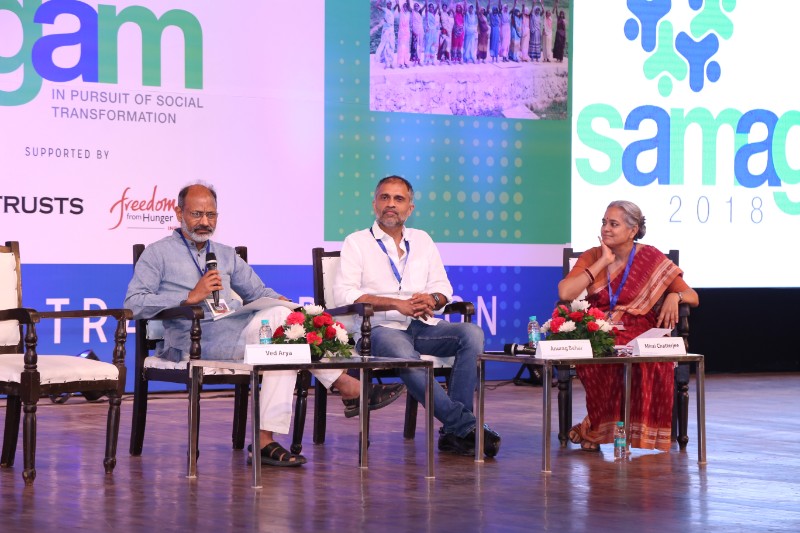 Discussion round followed the keynote address taking up tenets from Dr. Mehta’s speech with Anurag Behar (Azim Premji Foundation) and Mirai Chatterjee (SEWA) as discussants. The session was chaired by Ved Mitra Arya (Srijan). Ved initiated the discussion referring to Pratap Bhanu Mehta’s speech as a reminder to the old days which highlight the culture of PRADAN i.e. combining intellectual debate with action. These debates are not only valuable for the people who join PRADAN or the development sector, but also the Indian elite and the middle class who do not value the civil society. Ved pointed out that the techno managerial solutions suggested in the 60s and 70s while seemed a new mechanism to address things, they no longer stand sufficient in the current times. The process of formalization, as suggested by Mehta, might be beneficial for big players but will pose serious challenges for small businesses and the state which will largely be controlled by the big players. With a scenario like this, women show very high potential which largely goes untapped.
Discussion round followed the keynote address taking up tenets from Dr. Mehta’s speech with Anurag Behar (Azim Premji Foundation) and Mirai Chatterjee (SEWA) as discussants. The session was chaired by Ved Mitra Arya (Srijan). Ved initiated the discussion referring to Pratap Bhanu Mehta’s speech as a reminder to the old days which highlight the culture of PRADAN i.e. combining intellectual debate with action. These debates are not only valuable for the people who join PRADAN or the development sector, but also the Indian elite and the middle class who do not value the civil society. Ved pointed out that the techno managerial solutions suggested in the 60s and 70s while seemed a new mechanism to address things, they no longer stand sufficient in the current times. The process of formalization, as suggested by Mehta, might be beneficial for big players but will pose serious challenges for small businesses and the state which will largely be controlled by the big players. With a scenario like this, women show very high potential which largely goes untapped.
Mirai Chatterjee, differing to Mehta’s speech, stated that there has been a long way that the development sector, practitioners and thinkers have come in influencing development framework in the country. While women’s work was earlier considered a mere hobby and a time pass activity, today it is valued as economic contribution to the country’s GDP. Pointing out issues with Government upscaling contextually significant programs Mirai mentioned when the state replicate models they create entities which are a far cry from the foundation. State created SHGs and Federation are often very different from what, for example PRADAN has created.
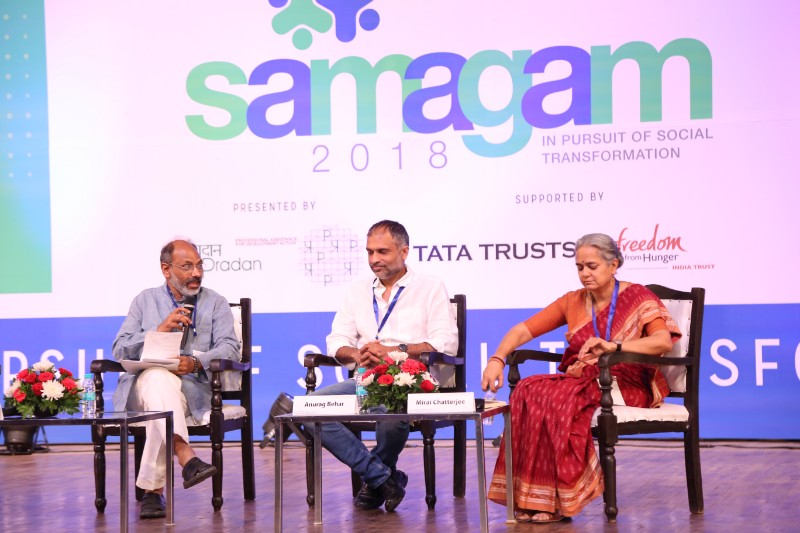 One key learning from PRADAN’s work has also been to see how grass root accountability can work. The grass root organization with membership based bodies, partnership with local governance bodies have projected how accountability at the ground can be made real. The biggest lesson that PRADAN has taught to the development sector and the world is the power of organizing the poorest, disadvantaged and forgotten. PRADAN has decisively shown the power of women’s leadership and has shown how women can be elected to local panchayats demonstrating what women’s leadership could do. Finally what PRADAN does is Anuband (linking all aspects of society). It is this attitude that promotes an economy of nurturance. Chatterjee stressed that need for small numerous formal entities to make the larger informal instead of huge vertical formals. This creates scope for flexibility, ownership for locals, local control and decision making, scope for organic growth. On the other hand the mainstream formal institutions have failed these entities. While these mainstream doors were shutting out the women, PRADAN has created bodies of women who know how to open these doors.
One key learning from PRADAN’s work has also been to see how grass root accountability can work. The grass root organization with membership based bodies, partnership with local governance bodies have projected how accountability at the ground can be made real. The biggest lesson that PRADAN has taught to the development sector and the world is the power of organizing the poorest, disadvantaged and forgotten. PRADAN has decisively shown the power of women’s leadership and has shown how women can be elected to local panchayats demonstrating what women’s leadership could do. Finally what PRADAN does is Anuband (linking all aspects of society). It is this attitude that promotes an economy of nurturance. Chatterjee stressed that need for small numerous formal entities to make the larger informal instead of huge vertical formals. This creates scope for flexibility, ownership for locals, local control and decision making, scope for organic growth. On the other hand the mainstream formal institutions have failed these entities. While these mainstream doors were shutting out the women, PRADAN has created bodies of women who know how to open these doors.
Ved Arya stressed on the lessons that civil society organizations have learnt from PRADAN, it could be said that it has demonstrated a culture of promoting a sisterhood or brotherhood which grow to be a formidable bond. To locate the organization across so many states and to work with so many families with one common purpose is a true success. This has led to many PRADANites going ahead to form many organizations with same vision and motif. At this juncture it would be interesting to focus on SDG 17; partnership and how civil society organizations could organize and work together to create greater impact.
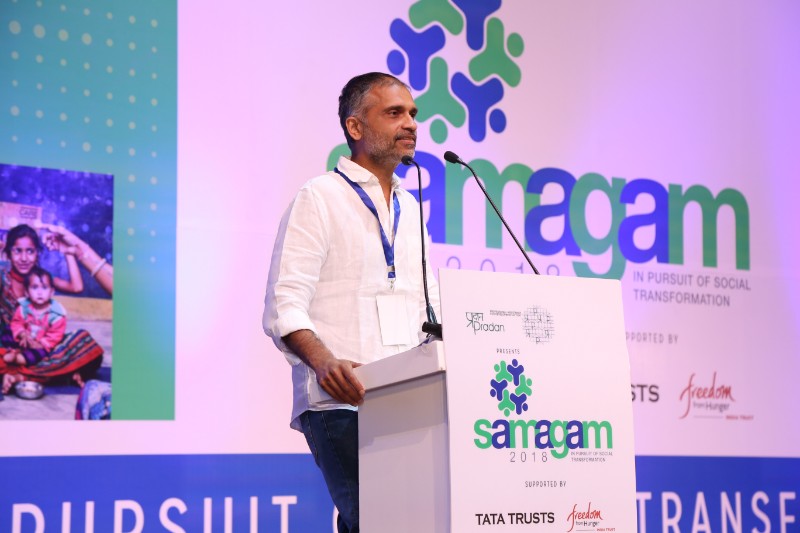 Anurag Behar, taking lead from Mehta’s analysis of the state of civil society organizations, posed the question “ab karen kya?” (what do we do now?). To respond to this question, Behar began with the work experience of the APF, which entered the space of elementary education with the belief that school education is one of the ways of human development and is a process or a route towards justice, equity and humaneness. A lot of this work over the last 15-16 years had become about mathematics, physics geography etc. Behar moved on to say that most of the civil society organizations are skirting away from the political issues. There is a lot of energy being invested on doing the livelihood and the physics and the land rights, but the deep political issues behind these are not completely addressed. This calls for a need to be much more actively out there political.
Anurag Behar, taking lead from Mehta’s analysis of the state of civil society organizations, posed the question “ab karen kya?” (what do we do now?). To respond to this question, Behar began with the work experience of the APF, which entered the space of elementary education with the belief that school education is one of the ways of human development and is a process or a route towards justice, equity and humaneness. A lot of this work over the last 15-16 years had become about mathematics, physics geography etc. Behar moved on to say that most of the civil society organizations are skirting away from the political issues. There is a lot of energy being invested on doing the livelihood and the physics and the land rights, but the deep political issues behind these are not completely addressed. This calls for a need to be much more actively out there political.
The second necessary thing apart from being political, according to Behar, is to be organized. Being organized is different from organizing community. PRADAN has been an extraordinary example to this effort of organizing organization, which creates the ground for being political.
The third point from Behar focused on the scarce opportunities for people who are willing to work for the society. Thinking of it from a political perspective leaves even fewer options. With the decline of Unions, the Seva dal, and the Communist leftist forces, there are hardly any space left for people to contribute for the society. Being political, being organized and being on the ground have become very little and have vanished. PRADAN stands for all of this and still stands to be an organization with all these capacities. Behar ended with a suggestion to PRADAN to be more political.
Ved summarized the discussion by saying that if one is on the ground and is taking charge of the change process then we can find some answers to what the way forward could look like.